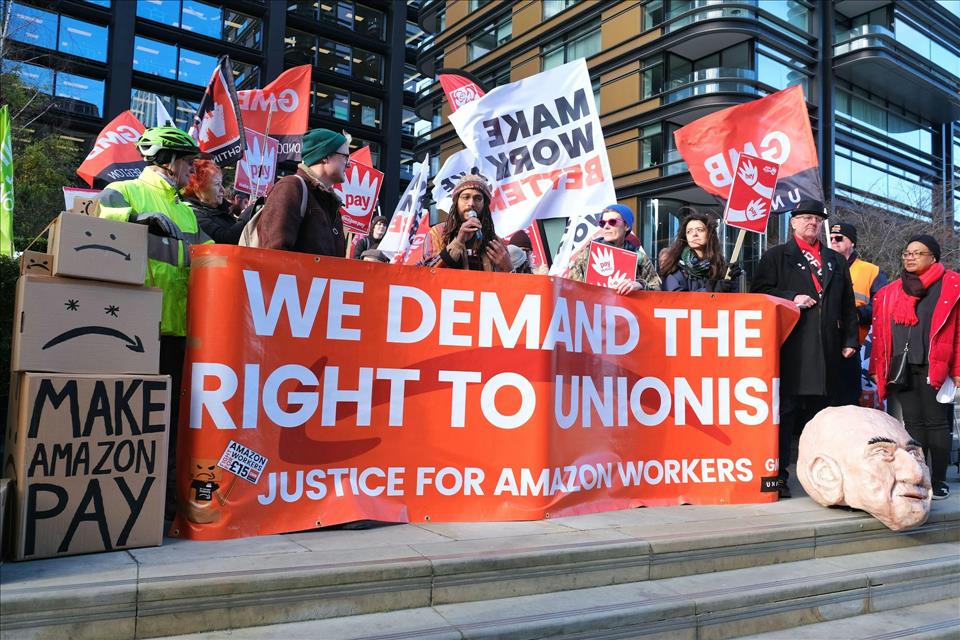
As Amazon Workers Prepare To Strike On Black Friday, The Story Of One Warehouse In The UK That Pushed To Unionise Podcast
Amazon is known for its resistance to unions. In this week's episode of The Conversation Weekly podcast, we tell the story of what happened at one warehouse in Coventry in the UK when its workers tried to gain official recognition for the GMB union, one of the country's biggest labour unions. The ballot was narrowly defeated by a margin of 28 votes, with 50.5% voting against forcing recognition.
We talk to sociologist Tom Vickers, who spent weeks observing workers' efforts to unionise at Coventry as part of a research secondment with the GMB. And we find out why some companies, many of them American, are so doggedly anti-union, and the tactics they use to persuade workers not to form one.
In January 2023, around 300 workers at the Amazon warehouse in Coventry went on their first official strike. The three-day strike followed months of disgruntlement at a proposed pay rise of 50 pence per hour.
Tom Vickers is an associate professor of sociology at Nottingham Trent University in the UK where he's director of the Work Futures Research Group , a new institute co-funded by the university and the GMB Union. Since January 2024, Vickers has conducted in-depth interviews with 11 leaders among the Amazon workers and four GMB organisers. He's also observed nine strike pickets and six mass strike meetings, and had informal conversations with around 200 workers. He says:
Under UK law, anyone can join a union even if it's not officially recognised by their workplace.
A vote for recognitionAfter the January strike and others that followed, Amazon workers continued to push for improved pay and conditions until they ultimately won a vote on whether to force Amazon to officially recognise the GMB union at the warehouse. Vickers explained what this would mean:
From his observations of the union activism in the lead up to the ballot, Vickers said it was difficult for worker leaders at the warehouse, whose time is strictly monitored in a regimented work environment, to make the case to their colleagues to join the union, and vote in favour of its official recognition. This contrasted to Amazon's own efforts to persuade workers to vote against, which Vickers says played to workers' fears over their job security.
Despite the failure to force union recognition in the ballot, in early September 2024 Amazon UK increased its minimum pay for staff by 9.8% to between £13.50 and £14.50 an hour, depending on the location.
The Conversation approached Amazon for comment on the allegations about its anti-union practices and treatment of workers raised in this episode. The company did not respond.
Economics, control and ideologyAmazon is not the only American corporation that opposes unionisation. In the US, the National Labor Relations Board (NLRB), a federal agency, has accused Amazon , Starbucks and the grocer Trader Joe's of retaliating against staff for union organising.
In response, all three companies have joined a challenge led by Elon Musk's SpaceX, to the constitutionality of the NLRB in federal court. The case could eventually make it up to the US Supreme Court.
So why are these companies, many of them American, so concertedly anti-union? John Logan, a professor of labour and employment studies at San Francisco State University in the US, says it's a combination of three factors:
However, Logan is optimistic about the future of union organising in the US, mainly because of the engagement of young people in new and different ways. He pointed to the success of union organising of workers at Starbucks and Trader Joe's.
Listen to the full episode of The Conversation Weekly podcast to hear the full story. The episode also includes an introduction from Sarah Reid, business and economy editor at The Conversation UK.
Newsclips in this episode from Channel 4 News , Bloomberg Television , GB News , ITV News and The Independent .
This episode of The Conversation Weekly was produced and written by Katie Flood and Gemma Ware is the executive producer. Sound design was by Michelle Macklem, and our theme music is by Neeta Sarl.
You can find us on Instagram at theconversationdotcom or via e-mail . You can also subscribe to The Conversation's free daily e-mail here .
Listen to The Conversation Weekly via any of the apps listed above, download it directly via our RSS feed or find out how else to listen here .

Legal Disclaimer:
MENAFN provides the
information “as is” without warranty of any kind. We do not accept
any responsibility or liability for the accuracy, content, images,
videos, licenses, completeness, legality, or reliability of the information
contained in this article. If you have any complaints or copyright
issues related to this article, kindly contact the provider above.

















Comments
No comment